Reductions found through sales tax adjustments, savings set-asides
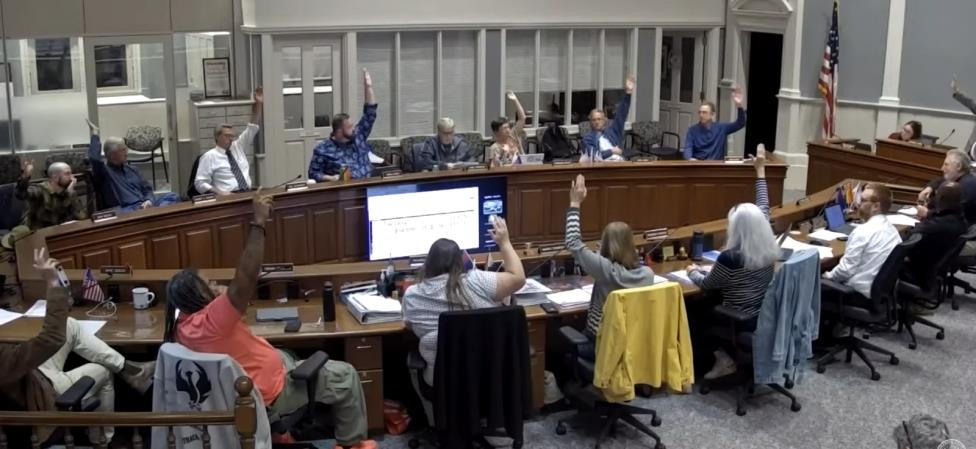
by Robert Lynch; October 9, 2025
Some legislative staffer, safely off-camera, whispered “Abracadabra.” It signaled magic. An idea had been floated. A vote was readied. New numbers were typed. A button was pushed. And suddenly, on the Legislature Chambers’ big screen, Tompkins County Government’s proposed tax increase found itself sliced about in half.
Any reporter skilled in Tompkins County budget politics realizes that fiscal catastrophes portended in April or July have a way of suddenly evaporating by mid-October. And so it will happen again this year.
Near the welcome end of an exhaustive, more than four-hour-long meeting October 8, as clerks battled fatigue and politicians grew amusingly punchy, a committee comprised of all 14 Tompkins County legislators found a way—as it always does—to trim next year’s tax levy increase to the low single digits.
By a unanimous vote, following those long hours of line-by-line addition and subtraction, the Legislature’s “Expanded Budget Committee,” a 14-person, self-made creation, settled on a 2026 County Budget that would raise next year’s tax levy by a mere 3.31 percent. For the hypothetical “median-value home,” should one truly exist, the county portion of your January tax bill would rise to $1,458.07, an increase of $20.08 over 2025. (Feel lucky if you own that “median” $300,000 house; most in Enfield don’t.)
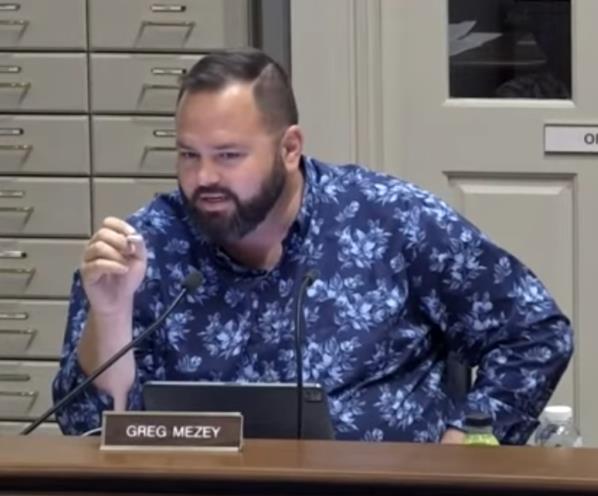
Although far below earlier estimates, the 3.31 percent increase would remain above New York State’s, penalty-free 2.75 percent tax cap set for Tompkins County. Legislators have already voted at a prior meeting to override that cap.
“I just don’t think in this time and this economy we can ask our taxpayers to pay more in their property tax when we have an opportunity to adjust revenues to a reasonable number that even if we’re off by 500 thousand we could still absorb,” Dryden’s Greg Mezey, a perennial fan of lower tax rates and smaller government surpluses, told the Wednesday night session. “I don’t think it’s too much to ask.”
The Expanded Budget Committee can only recommend action, not pass final judgment. But when members reconsider the recommendation as an official Legislature, October 21, they’ll likely grant the amended budget official status and forward it to a Public Hearing held near Halloween. A final legislative vote would follow.
The settled-upon 3.31 percent levy increase wasn’t always seen as attainable. Following a “budget retreat” in mid-July, one poorly-publicized and likely attended only by legislators and key staff, County Administrator Korsah Akumfi had predicted it might take a 20 percent hike in the levy to maintain current programs. And it might require a 40 percent increase to add beneficial program “enhancements.”
Then at the start of September, Akumfi’s deputy unveiled a more-refined, restrained, $240 Million recommended budget, one that would raise the tax levy by 4.5 percent. It was that 4.5 percent goal that legislators worked towards as they examined every line item and talked to every department head during a string of meetings that culminated with a trio of long, number-crunching sessions; first, October 2, then, again this past Monday, and finally, Wednesday night, the eighth.
How the once-feared double-digit tax hikes got averted flowed from combined legislative initiatives, each arising near the end of the long Wednesday night meeting. Newfield-Enfield legislator Randy Brown was one of the revision’s key architects.
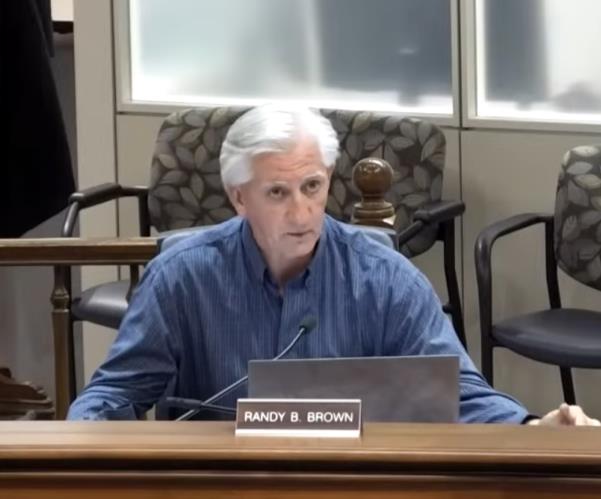
Incremental appropriations had already crept in. At the close of Monday’s meeting, the levy increase stood at 5.34 percent. Shortly after Wednesday’s start, it had climbed to 5.81 percent. Nearly three-and-a-half hours later, it stood at 7.77 percent. Randy Brown stepped in.
Brown cited a late-September report that pointed toward sales tax receipts increasing by as much as seven percent this year over last. Brown concluded that the County Administrator’s budget had projected next year’s sales tax income as too low. Brown moved to increase those sales tax revenues by an additional $1.25 Million. The committee’s majority would later trim that increase to $700,000. The revised amendment passed. The projected levy dropped.
Next Lansing’s Deborah Dawson entered with her contribution toward taxpayer frugality. Dawson turned to an obscure line item called the “Mandate Contingent Account.” It’s a rainy-day fund of sorts, established a couple of years ago to cover suddenly-imposed local mandates dictated by Albany or Washington.
Dawson proposed to cancel the Administrator’s funding of the Mandate Contingent Account with new tax money and instead support it through “fund balance”—the County’s accumulated savings.
Dawson’s initiative passed 13 votes to one. And when it did, the button was pushed and the levy increase dropped precipitously from 6.49 percent to that 3.31 percent final figure.
“My experience tells me that at the end of the process, y’all are going to want to use some fund balance anyway,” Dawson, the Legislature’s most savings-conscious member, told colleagues. “So if we’re going to use fund balance, let’s use fund balance for something that may or may not have to be spent,” she reasoned.
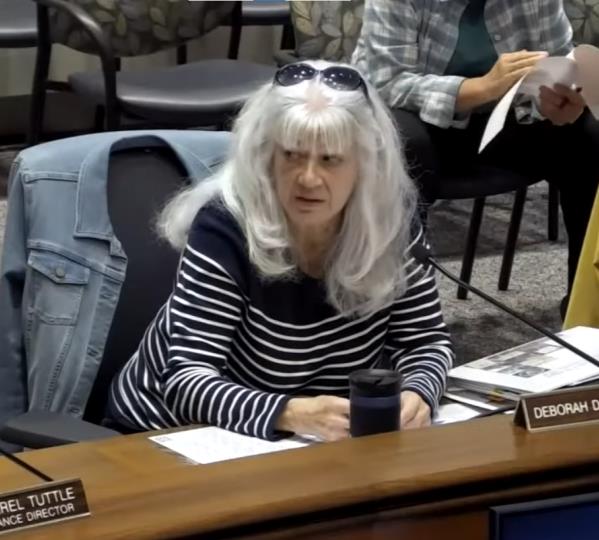
Administrator Akumfi was wary. He noted that already this year an outside mandate cost the county treasury $800,000. Akumfi urged only a fraction of the contingency account be drained, and that $1 Million in taxpayer funds still go into it. Dawson countered that a partial reduction would still bring a five percent tax increase, a landing point “that’s not going to be acceptable to everybody in this room,” Dawson insisted,
Enfield-Ulysses legislator Anne Koreman found herself the only legislator opposing the tax-cutting Dawson initiative.
“I’m not going to vote for this,” Koreman said. “I think this puts us back in a place where we’ve been for the last few years where we’re not having enough revenue.”
Koreman maintained that for many years Tompkins County has kept its tax increases artificially low, maybe holding increases to a couple percent, or to no increase at all, And because it has, the deeper the spending cuts County Government must make. Koreman called the practice “not sustainable.”
“Even the Town of Enfield raised their tax levy by over six percent,” Koreman reported. “You have costs going up, and if we get down to three percent or something like that, I don’t think that’s enough, and what are we going to do the next year?” she asked.
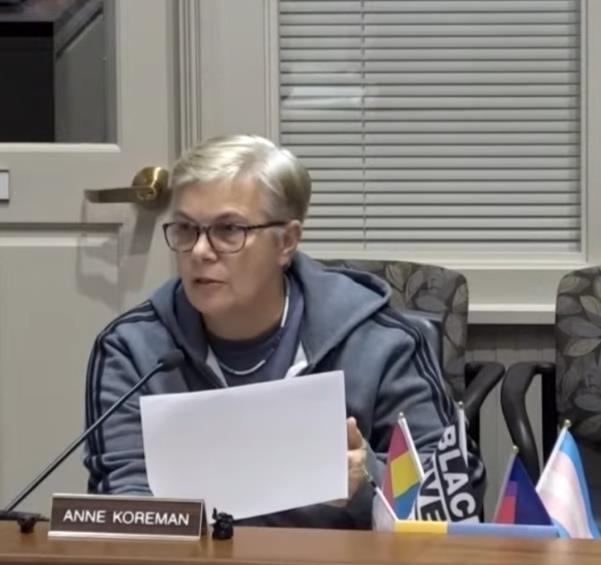
As the Expanded Budget Committee was putting final touches on the County Budget downtown Wednesday night, the Enfield Town Board, a handful of miles, but perhaps a financial world, away was buttoning-down its own finances, granting Preliminary Budget status to a spending plan that would raise next year’s Enfield tax levy by 6.53 percent.
Randy Brown’s heightened projections of sales tax receipts also got pushback at the Legislature committee’s meeting, including from Administrator Akumfi.
“I would suggest we take a cautious approach in how we overly estimate our revenue to make sure we have plenty of cushion,” Akumfi cautioned. “There is some degree of unpredictability with sales tax, especially going into 2026,” the Administrator warned.
Legislator Rich John agreed, and backed reducing Brown’s proposed sales tax revenue increase almost in half.
“I’d be comfortable with the $700,000 figure,” John said, “because I have some real trepidation; what’s going to happen at the federal level and what that’s going to do to the spending power at Cornell University, which will impact our community.”
Anne Koreman shared John’s concern.
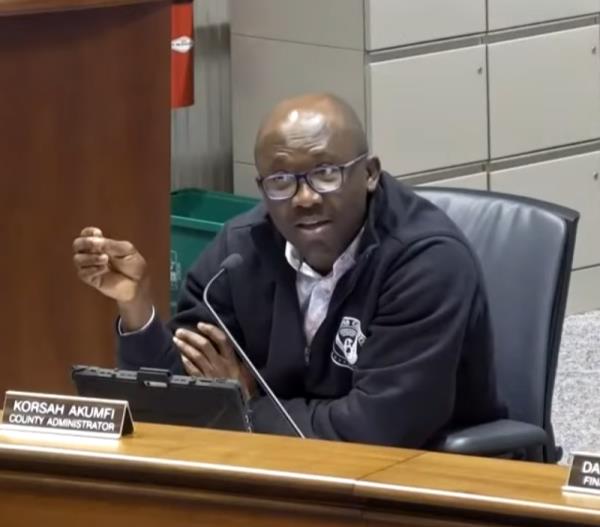
“We’re looking at unprecedented challenges in our community,” Koreman warned. “Just the ‘knowns,’ with housing, food, Medicaid aid and all of the trickle effects… There’s going to be issue after issue, major issues. I think this is a time to be conservative. I don’t even call it conservative; realistic.”
By a vote of nine-to-five, the committee amended Brown’s $1.25 Million proposed sales tax revenue increase to $700,000, and then adopted the change, with only Brown opposing the revised adjustment. With the levy cut to 3.31 percent, the final package secured everyone’s support.
“I know we want to be cautious and conservative,” Greg Mezey counseled. But being too cautious and pulling in too much money and leaving taxpayers with too little carries a price, he said.
“Otherwise, we’re going to do what we’ve always done, and we’re going to over-levy, and we’re going to sandbag our budget because we’re so afraid to go over/under by a couple hundred thousand dollars or a million here or there, that we’re going to over-collect unnecessarily so that we can realize revenue that we could have otherwise budgeted for.”
With the cuts that were made, consider the 2026 Tompkins County Budget pretty much settled now. There’ll be no 20 percent tax increase, nor one of ten percent, nor even the 4.5 percent Administrator Akumfi had recommended. Maybe some human service agencies denied funding will appeal and complain. But the big-picture issues were mostly laid to rest that long Wednesday night.
“I just want to acknowledge that this is really hard,” legislator Amanda Champion remarked, torn between leaving the taxpayers their money and providing them what they request. “We don’t want to increase the taxes on our constituents, and yet we also want to provide them with all the services,” she said, “and in some instances, it’s the same people.”
###

